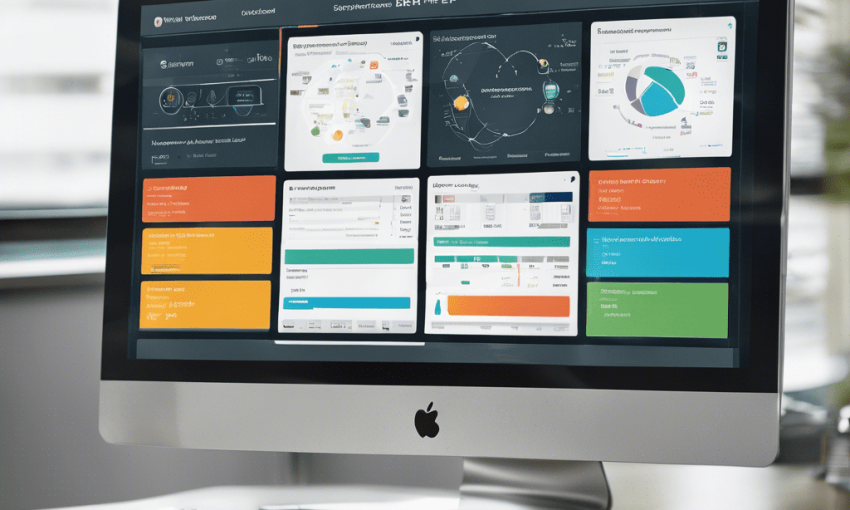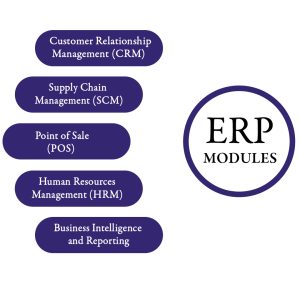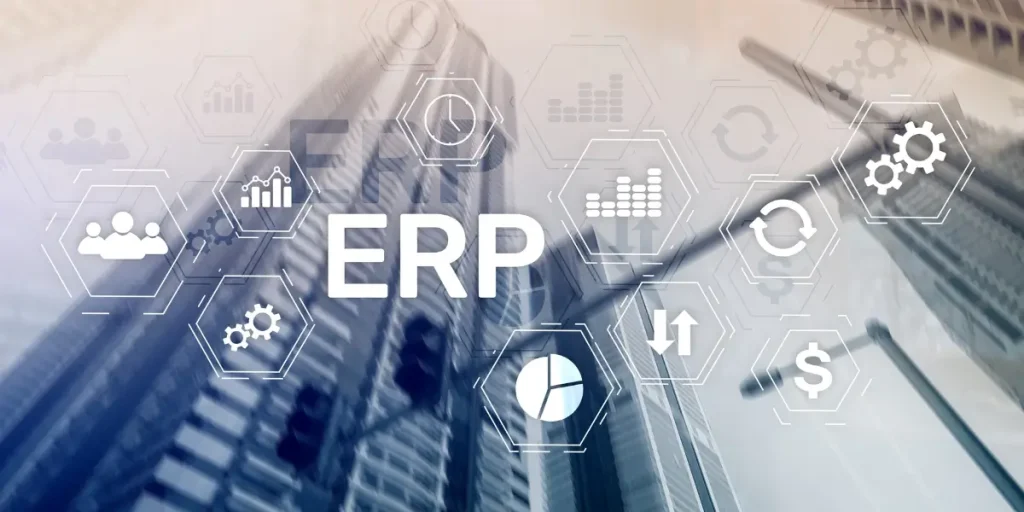ERP System for Businesses: Streamline Operations Efficiently 2024

Introduction:
ERP system or Enterprise Resource Planning system is a software application that enables businesses to manage their business operations such as inventory control, finance, manufacturing, sales, marketing, and human resources with a set of integrated applications. These applications connect all the different departments and establish a seamless flow of information across all the levels of an organization. In this article, we will discuss the benefits of implementing an ERP system for businesses.

Benefits of an ERP System for Businesses:
1. Improved Operational Efficiency
An ERP system can help businesses to automate their workflows, reduce manual processes, minimize errors, and increase productivity. By streamlining their business processes, businesses can optimize their resource utilization, reduce lead times, provide better customer service, and improve their bottom line.
2. Better Decision-Making Capabilities
An ERP system provides businesses with real-time data, customizable reports, dashboards, and analytics tools that can help them make informed decisions. By having access to accurate data from various sources, businesses can identify their key performance indicators, monitor their progress, and take timely actions to achieve their business goals.
3. Enhanced Collaboration and Communication
An ERP system can help to improve collaboration and communication between different departments, employees, customers, suppliers, and partners. By having a centralized database, businesses can share information, documents, and workflows easily, and streamline their communication channels.
4. Reduced Costs and Risks
An ERP system can help businesses reduce their operational costs, inventory costs, labor costs, and administrative costs by optimizing their resources, reducing waste, and increasing efficiency. By automating their workflows, businesses can also reduce the risk of errors, fraud, and non-compliance, and ensure better governance.
Conclusion:
Implementing an ERP system can bring significant benefits for businesses such as improved efficiency, better decision-making, enhanced collaboration, and reduced costs and risks. However, choosing the right ERP system and implementing it effectively requires careful planning, investment, and commitment from businesses. By adopting an ERP system, businesses can position themselves well for growth, innovation, and success.
Types of ERP Systems
There are several different types of ERP systems available to businesses, ranging from basic to complex. Some common types include ERP for small businesses, mid-size businesses, and larger enterprises. ERP solutions can also be industry-specific, catering to the needs of different industries such as healthcare, manufacturing, retail, and finance.
Cloud vs On-Premises ERP
Businesses can choose between a cloud-based ERP system or an on-premises ERP system. Cloud-based ERP systems are hosted on a remote server and accessed via the Internet. On-site ERP systems are set up and operated on the servers owned by the company. Cloud-based ERP systems are often more affordable and require less upfront investment, while on-premises ERP systems offer more control and customization options. The decision relies on the particular requirements and desires of the company.
Key Features of an ERP System
There are several types of ERP systems available to businesses, which include ERP for small, mid-size, and large enterprises. They can also be industry-specific, catering to the needs of different industries such as healthcare, manufacturing, retail, and finance. Businesses can choose between cloud-based or on-premises ERP systems, depending on their specific needs and preferences.
Inventory Management
An important feature of an ERP system is inventory management. It allows businesses to track and manage their inventory levels in real time. The decision relies on the particular requirements and desires of the company. In addition, it provides insights into demand forecasting and helps to manage the supply chain more efficiently.
Accounting and Financial Management
Another key feature of an ERP system is accounting and financial management. It provides a comprehensive view of the finances of the business, including accounts receivable, accounts payable, cash flow, and financial statements. This helps to ensure compliance with accounting standards and regulations, as well as improve financial transparency and accuracy.
ERP Implementation
An ERP system is an essential tool for businesses to manage and streamline their operations. However, implementing an ERP system can be a complex and challenging process. It requires careful planning, coordination, and the support of an experienced ERP consultant.
The Importance of Planning
Before implementing an ERP system, it is important to create a detailed plan that outlines the specific goals and objectives of the project. This includes defining the scope of the project, identifying key stakeholders, and establishing a realistic timeline and budget. A well-planned implementation can help to minimize disruption to business operations and ensure the success of the project.
The Role of an ERP Consultant
An ERP consultant plays a critical role in the implementation process. They can assist with selecting the right ERP system for the business, developing a detailed implementation plan, and providing training and support to employees. Their expertise and experience can help to ensure that the implementation is carried out efficiently and effectively and that the system meets the specific needs and requirements of the business.
Common ERP Solutions
Businesses can choose from a variety of ERP solutions to manage and streamline their operations. Two popular options are SAP ERP and Oracle ERP Cloud.
SAP ERP
SAP ERP is a widely used ERP system that offers a range of modules for finance, human resources, sales, and production. It is suitable for mid-sized and large businesses and can be customized to meet specific business needs. SAP ERP offers real-time reporting and analytics, making it easy for businesses to make data-driven decisions.
Oracle ERP Cloud
Oracle ERP Cloud is a cloud-based ERP system that provides a range of modules for finance, procurement, project management, and supply chain management. It is designed for large businesses and offers features such as machine learning, artificial intelligence, and predictive analytics. Oracle ERP Cloud also provides a user-friendly interface and easy integration with other Oracle products.
Customizable ERP Systems
Businesses can choose from a variety of ERP solutions to manage and streamline their operations. Two popular options include SAP ERP and Oracle ERP Cloud. SAP ERP is widely used and flexible, offering real-time reporting and analytics, making it easy for businesses to make data-driven decisions. On the other hand, Oracle ERP Cloud is a cloud-based system that offers features such as machine learning, artificial intelligence, and predictive analytics, with easy integration with other Oracle products. Customizable ERP systems improve efficiency and productivity, streamline processes and workflows, provide better data management and analysis capabilities, improve customer satisfaction and retention, and increase competitiveness in the market.
Table of Contents

what is ERP?
What is ERP?
Enterprise Resource Planning, commonly known as ERP, is a type of software system that helps businesses manage and integrate their core processes. In essence, ERP provides a unified platform where various business functions—like accounting, human resources, inventory management, and customer relationship management—are housed in one system. But what exactly does this mean, and why is ERP so critical in today’s fast-paced business world? Let’s dive deeper to explore the concept of ERP and its relevance in modern businesses.
A Brief History of ERP
To truly understand ERP, it’s important to look at where it all started. The concept of ERP evolved from Material Requirements Planning (MRP) systems, which were first developed in the 1960s. MRP systems were designed to help manufacturing companies manage their inventory and production planning. By the 1990s, ERP systems expanded beyond manufacturing and began integrating other departments, becoming an essential tool for all types of businesses. Today, ERP is no longer just a manufacturing tool but a comprehensive solution for organizations of all industries and sizes.
Defining ERP: What Does It Stand For?
ERP stands for Enterprise Resource Planning. It’s a set of integrated applications designed to manage and streamline business processes across various departments. Think of it as a company-wide system that connects different functions—such as finance, HR, and supply chain—into one cohesive unit. This interconnectedness allows for better data flow, real-time analytics, and seamless collaboration across departments.
The Key Components of an ERP System
ERP systems are composed of various modules that focus on different business functions. These modules are like building blocks that can be tailored to fit the specific needs of a business. Here are some of the core components of an ERP system:
1. Finance and Accounting
ERP helps streamline financial reporting, accounts payable and receivable and ensures compliance with regulatory requirements. It also provides real-time access to financial data for better decision-making.
2. Human Resources (HR)
This module manages employee data, payroll, recruitment, and benefits. It helps HR departments become more efficient by automating routine tasks like performance evaluations and leave tracking.
3. Supply Chain Management (SCM)
ERP systems assist in managing the entire supply chain—from procurement and logistics to inventory and distribution. By keeping all this information in one place, businesses can better forecast demand and avoid costly stockouts.
4. Customer Relationship Management (CRM)
A CRM module tracks customer interactions, sales, and marketing efforts. It helps businesses nurture relationships with customers by providing insights into buying patterns and customer needs.
5. Inventory Management
This module monitors stock levels, sales orders, and deliveries. It ensures that businesses maintain the right amount of inventory without overstocking or running out of stock.
6. Project Management
ERP systems often come with project management tools to help businesses plan, execute, and monitor projects. This ensures that projects stay on schedule and within budget.

How ERP Works: An Overview of ERP Functionality
At its core, ERP works by centralizing all of a business’s data into one system. Instead of using separate software programs for each department, ERP provides a single source of truth. For example, when the sales team closes a deal, that information is immediately available to the accounting department, which can then send out an invoice. This interconnectedness not only reduces errors but also improves efficiency by automating many manual processes.
ERP systems also offer real-time data analytics, allowing companies to make informed decisions faster. With customizable dashboards and reports, businesses can track key performance indicators (KPIs) and spot trends as they happen.
Types of ERP Systems
ERP systems come in various forms, depending on how they are deployed and managed. The three main types are:
1. On-premise ERP
In this setup, the ERP system is installed on the company’s own servers. While this gives businesses full control over their data and customization, it often requires a large initial investment and ongoing IT maintenance.
2. Cloud ERP
Cloud ERP is hosted on a remote server and accessed through the internet. It’s a more flexible and cost-effective option, especially for smaller businesses that don’t want the hassle of managing hardware.
3. Hybrid ERP
A combination of both on-premise and cloud ERP systems, hybrid ERP allows companies to have some functions in the cloud while keeping sensitive data on-site.
Benefits of Implementing ERP Systems
The advantages of implementing an ERP system can be transformative for businesses. Here are a few of the key benefits:
- Streamlined Operations: By automating repetitive tasks and reducing manual data entry, ERP systems increase operational efficiency.
- Enhanced Collaboration: Since all departments are connected, employees can easily share information and work together toward common goals.
- Better Data Management: With ERP, all company data is stored in one place, making it easier to track performance and generate reports.
- Cost Savings: While ERP systems require an initial investment, they often lead to long-term savings by reducing inefficiencies and improving productivity.
Challenges and Limitations of ERP Systems
Despite its benefits, ERP implementation comes with its own set of challenges. The high initial cost of ERP software and implementation is a common hurdle, especially for smaller businesses. Additionally, the complexity of the system means that companies must be prepared for a lengthy implementation process, which can take months or even years.
Another challenge is change management. Employees may resist new systems, and training them to use the ERP system effectively is crucial for a smooth transition.
ERP for Small Businesses vs. Large Enterprises
ERP systems aren’t just for big corporations. Today, many ERP vendors offer customizable solutions for small and medium-sized businesses (SMBs). These systems are typically more affordable and tailored to meet the specific needs of smaller companies. On the other hand, large enterprises often require more robust ERP solutions that can handle complex operations across multiple locations.
Industry-Specific ERP Solutions
Different industries have unique needs, and many ERP systems offer industry-specific modules. For example:
- Manufacturing ERP focuses on production scheduling, supply chain management, and quality control.
- Retail ERP integrates point-of-sale systems, inventory management, and customer loyalty programs.
- Healthcare ERP helps with patient records, billing, and compliance with health regulations.
- Education ERP streamlines student records, financial aid, and class scheduling.
How to Choose the Right ERP System for Your Business
Selecting the right ERP system involves evaluating several factors, including the size of your business, industry requirements, and the specific features you need. It’s essential to also consider vendor support, system scalability, and customization options to ensure the system can grow with your business.
Popular ERP Software Providers
Some of the top ERP software providers include:
- SAP: One of the leading ERP providers globally, offering comprehensive solutions for large enterprises.
- Oracle: Known for its powerful database systems and cloud ERP solutions.
- Microsoft Dynamics: A popular choice for businesses looking for user-friendly ERP tools.
- Infor: Focuses on industry-specific ERP solutions.
- Netsuite: A cloud-based ERP system ideal for growing businesses.
The Future of ERP Systems
The future of ERP is exciting, with emerging technologies like Artificial Intelligence (AI) and Machine Learning (ML) poised to revolutionize how ERP systems function. AI can automate routine tasks, while ML can analyze vast amounts of data to provide predictive insights. Integration with IoT (Internet of Things) is also gaining traction, allowing for real-time monitoring of physical assets.
Real-Life Examples of ERP Implementations
1. ERP in Manufacturing
A global manufacturer used ERP to integrate its production, inventory, and sales processes, leading to a 20% increase in productivity and better demand forecasting.
2. ERP in Retail
A major retail chain implemented ERP to synchronize its supply chain, leading to reduced stock shortages and improved customer satisfaction.
Conclusion
In today’s competitive business landscape, ERP systems play a critical role in ensuring smooth, efficient operations. From streamlining processes to providing real-time data insights, ERP helps businesses stay ahead of the curve. Whether you’re a small business or a large enterprise, the right ERP system can unlock significant value and transform the way you operate.
FAQs
- What is the difference between ERP and CRM?
- ERP focuses on managing all core business processes, while CRM specifically focuses on managing customer relationships.
- How long does it take to implement an ERP system?
- It depends on the complexity of the system and the size of the organization, but implementations can range from several months to over a year.
- Can small businesses benefit from ERP?
- Yes, many ERP systems are designed for small businesses, offering affordable solutions to streamline operations.
- What are the typical costs of ERP software?
- Costs vary widely based on the size of the business, the number of users, and the level of customization required, but they can range from a few thousand dollars to several million.
- Is ERP only for large corporations?
- No, there are ERP solutions designed for businesses of all sizes, including small and medium-sized companies.




